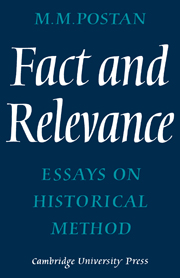Book contents
- Frontmatter
- Contents
- Acknowledgments
- Preface
- 1 Reason in social study
- 2 History and the social sciences
- 3 The historical method in social science
- 4 Function and dialectic in economic history
- 5 Fact and relevance in historical study
- 6 Economic and social history
- 7 Economic growth
- 8 A plague of economists?
- 9 The uses and abuses of economics
- 10 Agriculture and economic development: a lesson of history
- 11 Technological progress in post-war Europe
- 12 A study of history
- 13 Karl Marx: a democrat?
- 14 Hugh Gaitskell: political and intellectual progress
- Index
11 - Technological progress in post-war Europe
Published online by Cambridge University Press: 07 October 2011
- Frontmatter
- Contents
- Acknowledgments
- Preface
- 1 Reason in social study
- 2 History and the social sciences
- 3 The historical method in social science
- 4 Function and dialectic in economic history
- 5 Fact and relevance in historical study
- 6 Economic and social history
- 7 Economic growth
- 8 A plague of economists?
- 9 The uses and abuses of economics
- 10 Agriculture and economic development: a lesson of history
- 11 Technological progress in post-war Europe
- 12 A study of history
- 13 Karl Marx: a democrat?
- 14 Hugh Gaitskell: political and intellectual progress
- Index
Summary
Its title notwithstanding, this essay is essentially a methodological exercise. The methods of economic history have of late provoked a great deal of controversy. The controversy, mostly American in inspiration, has centred round the relations between economic history and economic theory. As in all previous debates on this theme both sides appear to accept the case for closer links between theory and history, and both sides have also been in favour of applying to historical evidence the most rigorous procedures of modern econometrics. So plausible, indeed so incontestable, has been the pro-theoretical and pro-econometric argument that most historians participating in a debate have been inclined to pass in silence the differences between the theoretical and the historical approaches to economic problems.
The silence is much to be regretted, and I intend to break it in this essay. It is because the differences exist that economic history has been able to lay claim to a distinct intellectual physiognomy. Without them it would have had no right to separate existence. The differences are many and various and I cannot attempt to deal with all of them on this occasion. All I propose to do is to remind my readers of the one well-understood difference that appears to me most important: especially important in the study of contemporary history in which I happen to be engaged.
The intellectual procedure characteristic of economic theory is that of ‘abstraction’ reinforced by ‘reduction’. The economists must abstract in order to remain economic. Strictly defined the range of phenomena regarded as economic by economists is much narrower than the universe of facts considered economic by the man in the street.
- Type
- Chapter
- Information
- Fact and RelevanceEssays on Historical Method, pp. 119 - 143Publisher: Cambridge University PressPrint publication year: 1971



